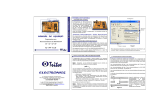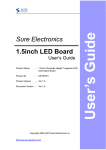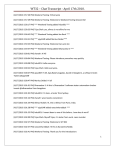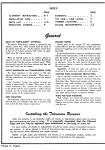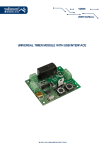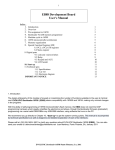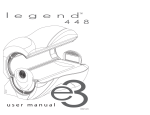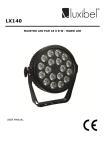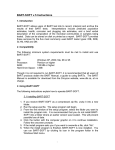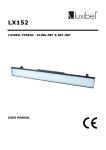Download E D U 02
Transcript
E D U 02 Solar Energy Experiment Kit Nederlands Français Deutsch Espagnol Italiano www.velleman.eu AGE 12+ VELLEMAN NV Legen Heirweg 33 9890 Gavere Belgium Europe www.velleman.be www.velleman-kit.com 10 exciting solar projects which you can actually use. Projects featured in this box: Solar-Powered LED ...........................................................................As long as the sun shines, the LED will light (pag.8) Flashing Solar LED ............................................................................................Solar-powered attention grabber (pag.10) Solar-Powered Cricket......................................... ......................As long as the sun shines, the cricket will chirp (pag.12) Simple Solar Battery Charger .................................. ..................... Free energy to keep your batteries in shape (pag.14) Solar Battery Charger with ‘Charge’ Indicator................... An LED turns on when the batteries are charging (pag.16) Solar Musical Instrument.................................................................. ............................. More light = higher note (pag.18) IR Remote Control Tester............................................................... ............................ ‘Listen’ to your IR remote (pag.20) Solar Garden Light............................... ................... LED turns on at dusk and turns off at dawn, fully automatic (pag.22) Solar Motion Detector / Beam Break Detector .............. ................... Announce wanted or unwanted guests (pag.24) Solar-Powered ‘Alarm Armed’ LED................... ................... Charges during the day, scares burglars at night (pag.26) Attention: All projects require direct sunlight or a strong incandescent lightbulb (min 60W). Fluorescent, energy saving, led and certain halogen lightsources are not suited or will not give satisfactory results. www.vellemanprojects.com 3 Parts supplied with this kit: 4V / 30mA solar cell This device will convert sunlight into electricity, which we will use in all projects. More light means more electricity. Point the black surface towards the sun. E1 (Velleman part# YH-39X35) SOLAR CELL Red B la ck Breadboard Will hold all your experiments. The white lines show how the holes are electrically connected with eachother (Velleman part# SDAD102) 4 www.vellemanprojects.com Ultrabright yellow & red LED Flat side Shortest leg = (-) Wire jumper Just a piece of bare wire to connect two points in a circuit. The yellow & red LED provide a lot of light and require a very low current to operate. Watch the polarity ! (Velleman part# L-5YAC & L-7104LID) Resistors R1 100 www.vellemanprojects.com Various resistor values are supplied. They serve as current limiters or as voltage dividers. Resistors do not have a polarity. Resistors values are indicated by means of coloured rings. The unit of resistance is called ’Ohm’. 5 Diode Diodes allow the current to flow in only one direction, from (+) to (–). Current flow in the opposite direction is blocked. (Velleman part# BAT85) Battery holder A special case: Zener diodes Zener diodes allow the current to flow from (+) to (-), as regular diodes do. If you invert the polarity, they drop a certain voltage, which can be found on the body of the zener diode, e.g. 2V4= 2.4V (Velleman part# ZA2V4) d Re B la ck Holder for two AAA rechargeable batteries. Mind the polarity (Velleman part# BH421A) 6 www.vellemanprojects.com Transistors E B C C B E A transistor is an amplification device. By means of a small current, a much larger current is controlled. Transistors come in two flavours, NPN and PNP-types, depending on the polarity. With this kit, you receive a BC557 (PNP) transistor. A transistor has 3 pins: Base, Emitter and Collector. (Velleman part# BC557B) Piezo speaker A piezo speaker converts an electric signal into sound. Polarity is not important (Velleman part# TV1) Microcontroller (µC) Noir Rouge A programmable device which can perform various tasks. We have pre-programmed it so that it will play musical notes or it will generate the sound of a cricket. This device is has a polarity. Watch the position of the notch. (Velleman part# VKEDU02) www.vellemanprojects.com 7 Project 1: Solar Powered Led As long as the sun shines, the led will light... 8 www.vellemanprojects.com Required parts: Solar cell, 100 ohm resistor (brown black brown gold), yellow led How it works: A closed circuit is required to make the current flow. Current flows from the (+) of the solar cell trough resistor to the (+) of the led and via the (-) of the led back to the solar cell. On a sunny day, the solar cell will generate 3..4 volts. The led only requires 2 volts to operate. Resistor R1 converts the excess voltage into (a little) heat, hereby protecting the led from damage. R1 100 E1 SOLAR CELL LD1 or ange Time to experiment: What happens when you swap (+) and (-) of the led? What happens when you replace the 100 ohm resistor with a 47000 ohm resistor (yellow purple orange gold) ? www.vellemanprojects.com 9 Project 2: Solar Flashing Led Solar powered attention grabber µC Jumper wire 10 www.vellemanprojects.com Required parts: Solar cell, 100 ohm resistor (brown black brown gold), yellow led, microcontroller (µC), wire jumper. IC1 PIC10F200-I/PG VDD 2 How it works: The controller requires 2-5V to operate. This voltage is supplied by the solar panel. The microcontroller is pre-programmed with software that turns the output on and off in a loop. The signal is output via pin 4. When the output is on, current flows via the led and the resistor, hereby causing the led to light. R1 SOLAR CELL 100 4 GP0/ICSPDAT GP2/T0CLKI/FOSC4 GP1/ICSPCLK VSS 5 3 GP3/MCLR/VPP 8 7 LD1 µC www.vellemanprojects.com 11 Project 3: Solar Powered Cricket As long as the sun shines, the circket will chirp... Jumper wire µC Jumper wire 12 www.vellemanprojects.com Required parts: Solar cell, microcontroller (µC), piezo sounder, wire jumpers 4 GP1/ICSPCLK GP3/MCLR/VPP 8 7 BUZ1 PIEZO GP0/ICSPDAT GP2/T0CLKI/FOSC4 VSS 5 3 SOLAR CELL Hint: Use this circuit as a wake-up-at-dawn alarm. It will wake you at sunrise... IC1 PIC10F200-I/PG VDD 2 µC + How it works: The controller requires 2-5V to operate. This voltage is supplied by the solar panel. The microcontroller is pre -programmed with software that generates a realistic cricket chirp. The chirp signal is output via pin 4. The electrical signal is converted to sound via the piezo speaker. www.vellemanprojects.com 13 Project 4: Simple Solar Battery Charger Insert two AAA 1.2V rechargeable batteries* Free energy to keep your batteries in shape... *Not included 14 www.vellemanprojects.com Required parts: Solar cell, BAT85 diode, battery holder for two AAA batteries, two AAA 1.2V rechargeable batteries. How it works: As long as the solar cell is exposed to light, a current will flow from the solar cell via the diode trough the batteries and back to the solar cell. The charge current depends on the amount of light that reaches the solar cell. Max. current with the supplied cell is 30mA. A diode prevents discharge of the batteries trough the solar cell (e.g. at nighttime), as it only allows the current to pass in one direction. www.vellemanprojects.com BAT85 SOLAR CELL How long does it take to fully charge the batteries? Check the capacity of your batteries. You can find this info printed on the battery. Usually, it is expressed in mAh, e.g. 300mAh. Multiply by 1.2 = 360mAh. Divide by 30mA = 12 hours Twelve hours of bright sunlight are required to fully charge the batteries (rule of thumb). 15 Project 5: Solar Battery Charger With ‘charge’-Indicator A led turns on when the batteries are charging... Insert two AAA 1.2V rechargeable batteries* *Not included 16 www.vellemanprojects.com Required parts: Solar cell, BC557 transistor, 4K7 resistor (yellow, purple, red, gold), yellow led, battery holder for two AAA batteries, two AAA 1.2V rechargeable batteries. How it works: When the sun shines, a current flows from the (+) of the solar cell via the Emitter/ Base of the transistor trough the batteries and BC557 back to the solar cell. This is the Base current, indicated with the dotted line. In our example, the Base current will also charge our batteries. The fact that there is a current flowing between SOLAR CELL 4K7 Emitter and Base causes the transistor to turn on and fully conduct, as if it were a switch. Hence, or ange le a current can flow from the solar cell via the transistor Emitter/Collector and resistor to the led and back to the solar cell. This current causes the led to light (solid line). For advanced users: The led turns off when the batteries are removed. Why ? In the simple battery charge circuit, there was a diode to prevent discharging of the batteries in low light condition. In this circuit, it has been omitted. Why ? www.vellemanprojects.com 17 Project 6: Solar Musical Instrument More light = higher note Wire Jumper wire 4K7 4K7 µC PIC 470 18 www.vellemanprojects.com Required parts: Solar cell, microcontroller (µC), 2x 4K7 resistor (yellow, purple, red, gold), 470 ohm resistor (yellow, purple, brown, gold), 2V4 zener diode, piezo sounder, wire jumpers, wire. 7 VSS + VDD 2 How it works: The solar cell IC1 R3 provides the supply voltage for the PIC10F220 microcontroller. Once it receives 470 R1 2VDC it starts running its internal 4K7 program. The zener diode and the 470 ohm resistor make sure the 8 GP3/MCLR/VPP 5 supply voltage of the controller GP0/ICSPDAT 3 GP2/T0CLKI/FOSC4 never goes beyond 2.4V, even in ZD1 4 GP1/ICSPCLK bright sunlight. A too high voltage SOLAR CELL R2 2V4 4K7 BUZ1 can damage the device. The PIEZO voltage generated by the solar cell is also divided by two by means of two equal resistors (4K7) and fed to the analog input of the PIC. Even in bright sunlight, the input receives no more than 4.5/2 = 2.25VDC. The internal software ‘measures’ the voltage at the input and translates it to a variable audio frequency (note). The piezo sounder converts the signal into sound. When the amount of light received by the solar cell changes, the voltage at the input of the controller will also change. The sofware will notice this and change the tone. With a bit of practice, you could play a tune by waving your hand or a flashlight over the solar cell. www.vellemanprojects.com 19 Project 7: IR Remote Control Tester ‘Listen’ to your IR remote PIC +/- 5cm 20 www.vellemanprojects.com How it works: Solar cells are sensitive to infrared light. When hit by infrared light, they generate a voltage, like they do with sunlight. IR remote controls generate a beam of infrared light when they are operated. This beam of light is turned on and off very fast by the internal electronics of the remote control. The pattern generated by the on-off transitions is different for each button of the remote. This allows the receiver to recognise each individual button. In this circuit, the on-off transistions are translated into sound by the piezo sounder. www.vellemanprojects.com + Required parts: Solar cell, piezo sounder, IR remote control (option). BUZ1 PIEZO SOLAR CELL More fun: Try ‘listening’ to different light sources such as led lighting, fluorescent lighting, etc... 21 Project 8: Solar Garden Light Led turns on at dusk and turns off at dawn, fully automatic 470 4K7 Jumper wire Insert two AAA 1.2V rechargeable batteries* *Not included 22 www.vellemanprojects.com Required parts: Solar cell, BC557 transistor, 4K7 resistor (yellow, purple, red, gold), 470 ohm resistor (yellow, purple, brown, gold), BAT85 diode, yellow led, battery holder for two AAA batteries, two AAA 1.2V rechargeable batteries, jumper wire. www.vellemanprojects.com Led current (only at night) BAT85 SOLAR CELL Base current (only at night) D1 Charge current How it works: When the sun shines, the voltage generated by the solar cell will be higher than the voltage of the batteries, so a current will flow from the solar cell to the batteries. This current will charge the batteries. The BAT85 diode prevents discharging of the batteries trough the solar cell in low light conditions. The base of the transistor is tied to ground (-) by means of the 4K7 resistor. This causes the transistor to turn on and allows a current to flow from the batteries trough the transistor, the led and via 470 ohm resistor back to the batteries. The led will turn on. However, note that the base of the transistor is also tied to the (+) of the solar cell, so as long as the sun shines, the base of the transistor is kept high enough to prevent turn-on of the transistor, so the led remains off at daytime. BC557 orange led R1 4K7 R2 470 23 Project 9: Solar Motion Detector / Beam Break Detector Announce wanted or unwanted guests Jumper wire 4K7 4K7 µC 470 Wire 24 www.vellemanprojects.com Required parts: Solar cell, microcontroller (µC), 2x 4K7 resistor (yellow, purple, red, gold), 470 ohm resistor, (yellow, purple, brown, gold), 2V4 zener diode, piezo sounder, wire. www.vellemanprojects.com VDD 470 SOLAR CELL R2 4K7 4 BUZ1 PIEZO GP3/MCLR/VPP GP0/ICSPDAT GP2/T0CLKI/FOSC4 GP1/ICSPCLK VSS 5 8 3 ZD1 2V4 7 R1 4K7 IC1 PIC10F220 2 R3 + How it works: The solar cell provides the supply voltage for the microcontroller. Once the controller receives 2VDC it starts running its internal program. The zener diode and the 470 ohm resistor make sure the supply voltage of the controller never goes beyond 2.4V, even in bright sunlight. A too high voltage can damage the device. The voltage generated by the solar cell is also divided by two by means of two equal resistors (4K7) and fed to the analog input of the controller. Even in bright sunlight, the input receives no more than 4.5/2 = 2.25VDC. The internal software ‘measures’ the voltage at the input and compares it to the previous level. When it detects a sudden change (i.e. When the beam is interrupted or someone casts a shadow on the solar cell ), it generates a sound trough the piezo. 4 P P 4 4 25 Project 10: Solar Powered ‘Alarm armed’-led Charges during the day, scares burglars at night Insert two AAA 1.2V rechargeable batteries* Jumper wire 4K7 PIC Jumper wire 26 µC 100 *Not included www.vellemanprojects.com Required parts: Solar cell, microcontroller (µC), 4K7 resistor (yellow, purple, red, gold), 100 ohm resistor, (brown, black, brown, gold), BAT85 diode, BC557 transistor, battery holder for two AAA batteries, two AAA 1.2V rechargeable batteries, wire jumpers, red led. www.vellemanprojects.com D1 BAT85 2 BC557 IC1 VDD PIC10F200-I/PG GP0/ICSPDAT GP2/T0CLKI/FOSC4 R1 4K7 GP3/MCLR/VPP VSS GP1/ICSPCLK 8 5 3 4 R2 100 Red led 7 SOLAR CELL How it works: When the sun shines, the voltage generated by the solar cell will be higher than the voltage of the batteries, so a current will flow from the solar cell to the batteries. This current will charge the batteries. The BAT85 diode prevents discharging of the batteries trough the solar cell in low light conditions. The base of the transistor is tied to ground (-) by means of the 4K7 resistor. This causes the transistor to turn on and supply power to the µcontroller. The controller will behave identical to project 2, so the led will flash. However, note that the base of the transistor is also tied to the (+) of the solar cell, so as long as the sun shines, the base of the transistor is kept high enough to prevent turn-on of the transistor, so the led remains off at daytime. 27 Modifications and typographical errors reserved © Velleman nv. HEDU02 - 2010 - ED1 VELLEMAN NV Legen Heirweg 33, 9890 Gavere Belgium - Europe 5 410329 438111

































